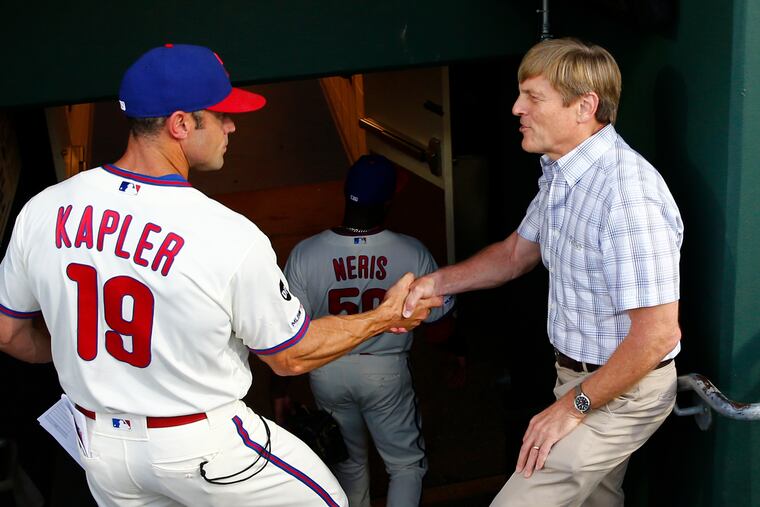However the Phillies feel about Gabe Kapler, the fans’ feelings might matter more | David Murphy
A manager has two job responsibilities. One, keep the players happy. Two, keep the fans happy.

I’m what you might refer to as a managerial skeptic. There are times when I think you could take a semi-intelligent person off the street and put him or her through a 48-hour training session and have yourself a person in the dugout whose win total would not deviate significantly from that of the most grizzled of baseball lifers.
You take the starting pitcher out when he’s getting hit, you bring the lefty in to face the lefty, and you bat your best hitters before your worst hitters. It ain’t multivariable calculus, which is why baseball is the only sport where you see a former player without a day of coaching experience waltz in and take a team to the playoffs. For the most part, the decisions make themselves.
In reality, a manager has two job responsibilities. One, keep the players happy. Two, keep the fans happy. Lose either group and you have effectively lost your job.
It’s Gabe Kapler’s failure in that second area that leaves the Phillies with little choice but to seriously consider a change in direction.
I’m not a Gallup pollster, but I think it is safe to say that a critical mass of the fans has decided where the bulk of the blame for this putrid season lies.
I do not agree with that assessment. You could put anybody from Charlie Manuel to Joe Torre in the dugout and they would not have been able to coax a playoff berth out of this rotation and bullpen.
The Phillies’ .500 record is overwhelmingly a result of three factors: injuries to Andrew McCutchen and the top four relievers in the bullpen, a lack of depth in the farm system, and the front office’s misplaced faith in its group of young starters.
You can certainly wonder whether a different voice might have helped Rhys Hoskins snap out of the slump that saw him finish with an OPS nearly 70 points lower than his previous career mark. You can also question the wisdom of parting ways with pitching coach Rick Kranitz and promoting the more analytically minded Chris Young. But the Phillies’ biggest problem this season was with the capabilities of their personnel, and not the guy managing it.
Still, from the moment of Kapler’s hiring, it was evident that he would never get the benefit of the doubt in the event of a season such as this.
In his introductory news conference, he and his bosses all framed the move as a daring, progressive departure from convention that would ultimately pay dividends in the win column. Kapler talked about hunting value at the margins and creating competitive advantage and caring about players so intensely that their performance would sharpen as a result.
General manager Matt Klentak used the word powerful to describe Kapler’s ability to connect with people. While both men clearly believed in the message they were preaching, the message itself was inherently at odds with fans who have long recoiled at any implication that somebody might know better than they do.
Kapler did not do himself any favors with some early snafus in his first season at the helm, including an embarrassing incident in the Phillies’ opening series in which he inserted reliever Hoby Milner into a game without warming him up. The debacle did not have much of an impact on the Phillies’ win total that season, but it only amplified the perception that Kapler was more Ted talker than manager.
Two years later, we’ve arrived at a point where perception is the reality that the Phillies must confront. In 10 of their last 14 games, the Phillies have failed to crack 28,000 in attendance. The only exceptions came in a pair of two-game series against the Red Sox and Mets, two opponents that typically pack the house with their own fans.
In those 10 games, the Phillies’ average attendance was actually lower than the 26,000-plus that they averaged over the entirety of last season.
Consider the attendance for Sunday’s season finale, when the Phillies drew 31,805 fans, compared with 34,202 last season. In last year’s final home series, against the Braves, they drew 89,000-plus over three games. This year, against the Marlins, that number fell to less than 84,000.
For a city desperate to rekindle the energy and passion that filled the ballpark during the Phillies’ run atop the NL East from 2008 through 2011, the malaise that has surrounded this team over the last month represents a significant step backward.
From a revenue perspective, there isn’t a sport that is more reliant on the health of its nightly gate than baseball is. If these fans have decided that they cannot muster the energy to get behind a team with Kapler at the helm, then John Middleton’s decision really shouldn’t be difficult at all.